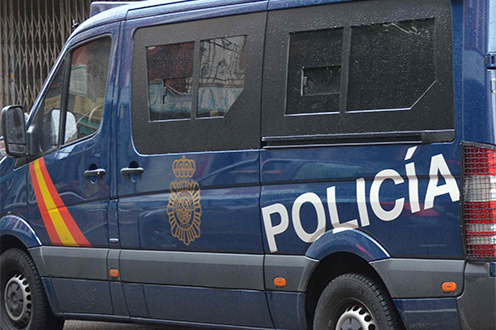Fight against terrorism
The seven Jihadi terrorists arrested by Spanish National Police Force had set up an international criminal network to send logistics material to terrorist groups Jabhat al-Nusra and DAESH
News - 2016.2.7
In addition to the six arrested in the early hours, a seventh individual was arrested later on Sunday morning. Following this operation, the National Police Force has managed to disband a cell whose members formed an international criminal network engaged in sending logistics material to the terrorist groups Jabhat al-Nusra and DAESH, operating in Syria and Iraq. This logistics material was essential for sustaining the terrorist activities of the two groups.
The arrests were carried out in the following towns and villages in Alicante: Crevillente, L´Alquería D´Ansar, Muro d´Alcoi, Alcoy and the city of Alicante. Arrests were also made in Onteniente (Valencia) and in the Autonomous City of Ceuta. Among those arrested are five Spaniards of Syrian, Jordanian and Moroccan origin, and two foreigners, of Syrian and Moroccan nationality, both residents in Spain. In total, twelve search warrants were executed in the properties of the detainees, as well as two business premises and warehouses where they carried on their illegal activities.
The investigations, which started back in 2014, confirmed that this international network carried out support and maintenance work for the logistics and operational structures of the terrorist groups Jabhat al-Nusra (JaN) and DAESH/Islamic State.
The group disbanded, characterised by its well-run organisation and the distribution of specialised tasks among its members, formed part of a stable and fully deployed "logistics apparatus". They had been operating for some time in various European countries until their stable and definitive establishment in Spain. Their activities also included funding and money laundering.
The operation and running of the group was exercised by one member alone, who had established his permanent leadership based on trust, shared interests and similar radical ideologies. This leader centralised and ran all the activities through a business complex which allowed him, without raising suspicions, to send materials in closed containers from Spanish ports to terrorist groups operating in Syria and Iraq.
Increase in orders
The military pressure being exercised in the conflict zone on terrorist groups has forced them to increase their supply needs, not only of fighters, but also of technological supplies, weapons and military equipment. The main aim of the network dismantled on Sunday was to cover these needs. It did this effectively, to the full satisfaction of these groups, evidenced by the subsequent increase in orders of more specialised goods. These continuous supplies shipped by the criminal network disbanded, directly boosted the continuity and strengthening of terrorist structures in Syria and Iraq.
The fraudulent cover used for these shipments comprised the sending of humanitarian aid to conflict zones, while what was actually shipped among various other goods was military material, money, electronic equipment and transmitters, firearms and precursors intended for manufacturing explosives.
The funding necessary for preparing all of these shipments of merchandise to Syria and Iraq principally came from money wires through international money order companies, using intermediaries and, above all, payments and financial transactions beyond the scope of the legal system, using the method known as "Hawala", whereby those under investigation were able to elude the control of the authorities.
Recruitment of women to marry Jihadi terrorists
In parallel to these illegal business activities, the leader of the network maintained ongoing and fluid relations with a member of the terrorist group DAESH, who asked him on several occasions to recruit women to travel to Syria in order to marry Jihadi terrorists fighting under its command, following the guidelines established by its leader, Abu Bakr al-Baghdadi.
As is standard practice in Jihadi groups, the network dismantled in this police operation used social networks as the main form of communication in order to carry on its criminal activities, as well as through the operation of personal profiles whereby they published comments in favour and defence of the actions of the terrorist groups Jabhat al-Nusra and DAESH.
In this regard and within the framework of the national security strategy, specifically in the fight against terrorism, the operation carried out by the General Commissariat of Information was framed within the activity of the "comprehensive and global capture of terrorists, the prevention of recruitment activities and the planning of terrorist actions, acting against their support networks and cutting off their funding, and access to the material necessary to carry out attacks and bring terrorists to justice".
The police operation, which was carried out under the orders of the Judge presiding over Central Investigation Court number six of the Spanish National High Court, also involved participation from police officers of the Provincial Information Brigades of Valencia, Alicante and Ceuta, as well as of the General Commissariat of Information.





